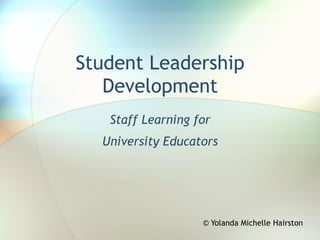
Student Leadership Development Theory
- 1. Student Leadership Development Staff Learning for University Educators © Yolanda Michelle Hairston
- 2. Student Leadership Development Theory • Actually 2 distinct sets of theories: Leadership and Student Development • Developing leadership is very different from educating or training leaders
- 3. Leadership Theory • Traditional Paradigm -Leader-centered -Responsibility on individuals with position, authority, power -Followers are passive KEYWORDS: Power Persuasion Control Hierarchy Management
- 4. Leadership Theory • Emerging Paradigm -Process-centered -Leaders and followers work together toward shared goals -Everyone is a change agent KEYWORDS: Change Collaboration Value-based Communication
- 5. Development Theory • Leadership is married with Psychological Theory. • Chickering’s Theory (psychological) has 7 Vectors that pertain to students’ leadership development, as well as their different maturity levels while in college. • Students can start at different levels (experience, maturity, other factors).
- 6. Chickering’s Vectors 1. Achieving Competence 2. Managing Emotions 3. Developing Autonomy 4. Establishing Identity 5. Freeing Interpersonal Relationships 6. Developing Purpose 7. Developing Integrity
- 7. Vector 1: Achieving Competence • Sense of competence about own ability to cope with and achieve what one sets out to do; intellectual competence is important. • Example: Students in Freshman year may be very worried about their ability to succeed academically or to get along with others.
- 8. Vector 2: Managing Emotions • Biological/Social in origin; control over behavior by parents/society is lessened so students must develop own controls; manifests self in dealing with lust, hate. • Example: Students at this stage may be polar in relationships, extreme in their likes, dislikes.
- 9. Vector 3: Developing Autonomy • Moving away from need for approval, while recognizing the importance of other people; begin to develop mutually helpful relationships based on respect; can also be seen as moving from dependence to interdependence. • Example: Students don’t need approval from peers as much as to be in relationships with them; moving from self as center of universe and can comprehend role in teams.
- 10. Vector 4: Establishing Identity • Critical stage for college students, many get stuck here; solid sense of self is the outcome (physical, social, intellectual). • Example: Students begin to be comfortable with their strengths and weaknesses; can take constructive criticism; can begin to distinguish personal values.
- 11. Vector 5: Freeing Interpersonal Relationships • Increased ability to interact with others in a meaningful way; changes nature of friendships and relationships; appreciation for diversity and difference appears here. • Examples: Openness and interest in people different from themselves and in understanding their points of view; develop empathy; build relationships built on trust.
- 12. Vector 6: Developing Purpose • Having a sense of future direction based on integration of personal identity. • Examples: Making career choices based on congruence with personal values and self-concept; choosing partners based on similar congruence.
- 13. Vector 7: Developing Integrity • Clarification of a personally valid set of beliefs which provide a tentative guide for behavior, relativistic consideration of “rules.” • Example: Making choices and decisions based on set of tested personal values; doing things based on these values and not based on laws, authority, or peer influence.
- 14. How You Can Turn Theory Into Practice • Understand that students can start at different levels (vectors) depending on background, experience, maturity level. • Understanding the vectors and student development can help you better determine leaders, roles, wants, needs, and personal expectations of students.
- 15. How You Can Turn Theory Into Practice, cont’d. • Challenge and support students at their own levels, not yours. • Ensure a balance between your professional goals and those which hinge on students’ progress. • Find ways to meet students where they are (not just in terms of physical locations, but on mental, emotional, and social development levels.)
- 16. Credits • Courtney Collins-Shapiro, University of Maryland Hillel • Kip Lombardo, Rochester Institute of Technology Hillel • Center for Creative Leadership, Greensboro, North Carolina Presented by Yolanda M. Hairston